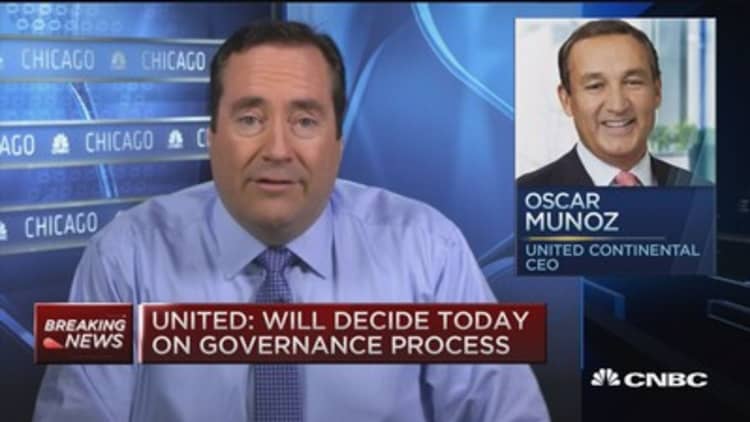
Airline giant United Continental's image, already facing turbulence from the sudden resignation of its CEO last month, is now having a rockier ride after the company played coy for days over the health status of his replacement — and who is running United in his absence.
Experts in crisis public relations and corporate governance say United's plan for communicating with the public on the heels of Oscar Munoz' hospitalization last week hasn't gone far enough in assuaging concerns among shareholders and the general public.
United has not confirmed, or denied, the accuracy of reports that Munoz suffered a heart attack as late as last Thursday, and has not said how serious his health condition is. And while the company said Monday it will "conclude the corporate governance process necessitated by" Munoz' hospitalization as early as Tuesday, it hasn't said exactly what that means or who might end up running the carrier.
Both statements — and their vagueness — have spurred intense speculation.
"I think it could have been done better," said Chris Giglio, president of HL Strategic Solutions in New York, whose clients have included New York Yankees General Manager Brian Cashman.
Giglio criticized the two public statements United has made on the heels of Munoz' hospitalization.
"The first statement, it said, 'We are continuing to operate normally.' Well, it's not normal not to have your CEO," Giglio said. "That's a statement, that in an isolated way, doesn't make complete sense. It's normal to have someone in charge."
He said United's second statement, that it was engaging in a "corporate governance process" to deal with Munoz' physical absence from the company, "didn't do them any good."
"It didn't add anything to the situation," Giglio said.
A United spokeswoman declined to comment for this article, referring a reporter to the company's prior statements about Munoz when asked about the criticisms of how it has handled the situation.
Giglio said that in its first statement last week, United "should have absolutely put in the name of someone who was provisionally in charge, even if that were temporary. People like to see a name."
Not naming a person who will lead the company while Munoz is getting treatment "does not give people confidence," Giglio said.
He added that United has less "wiggle room" in dealing with such a situation than other companies because it's still dealing with the aftermath of the abrupt departure of Jeff Smisek, whom Munoz replaced.
Smisek resigned in September amid a federal criminal probe into whether the airline restarted money-losing flights in order to get the then-chairman of the Port Authority of New York and New Jersey to authorize improvements to Newark's Liberty Airport. Ex-P.A. chairman David Samson reportedly wanted the flights restored between Newark and Columbia, South Carolina, so that he could fly to a home he has there.
PR expert Mike Paul, whose firm Reputation Doctor advises clients in crisis situations, said United's failure to say anything about Munoz' health status beyond the fact he is hospitalized creates an information vacuum that encourages speculation by shareholders and outsiders.
And "we human beings tend to guess at the extremes" about what's actually going on when corporations give such statements, Paul said. "The assumption is you're hiding something."
Paul said that even if United cannot say exactly what happened to Munoz, because doctors are still trying to figure that out, "you lose nothing, in my professional opinion, if you say, 'We still haven't gotten a clear answer to important health questions. ... It might take a day or two more.'"
Paul said there are several reasons why companies presented with an executive's health crisis or other unusual events end up making no comment, or issuing public comments that don't do much beyond fueling speculation going.
"One is fear of saying something wrong," Paul said."Two: inexperience in dealing with these things."
And third, "The people that are running the [company] ... don't have the same skill-set we do, and sometimes they believe that less information is better," Paul said. "That is a horrible decision to make from a public company's perspective. There will be diminishing returns from that decision very quickly."
B. Espen Eckbo, faculty director of Tuck's Lindenauer Center for Corporate Governance at Dartmouth College, said having a company quickly release information that sets shareholders' minds at ease during a crisis "should be routine" at this point.
"It seems to me that there should be a way of dealing with these things by now," Ecbok said. "People should understand that the first thing to do is the CEO informs the board immediately about the situation. The second is for the board to issue a press release the next day informing everybody about what they know at that point."
In the case of United, Eckbo acknowledged that there may be privacy concerns about the exact details of Munoz' health. But, "it's clearly a fiduciary responsibility to shareholders here that has to be upheld," he said. "Emotions aside, there has to be a way to communicate these things without disclosing a privacy issue."
However, he added, "that's the gray area because even the doctors may not be sure what's going on."
"It is of course sensitive information," Eckbo said, referring to someone's health status. "You don't want to scare the market into thinking something they shouldn't be thinking."
But, he said, 'you've got to get the basics of the information out."





